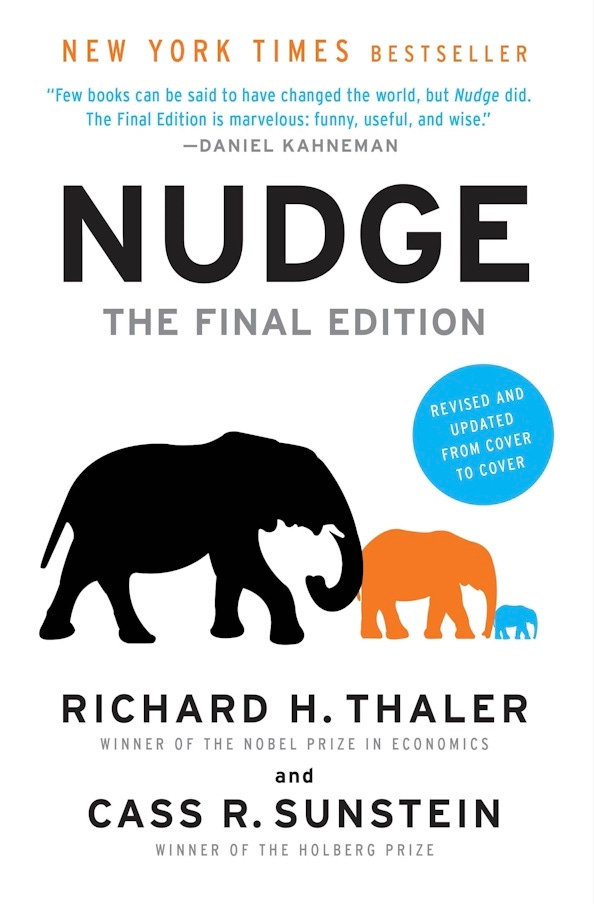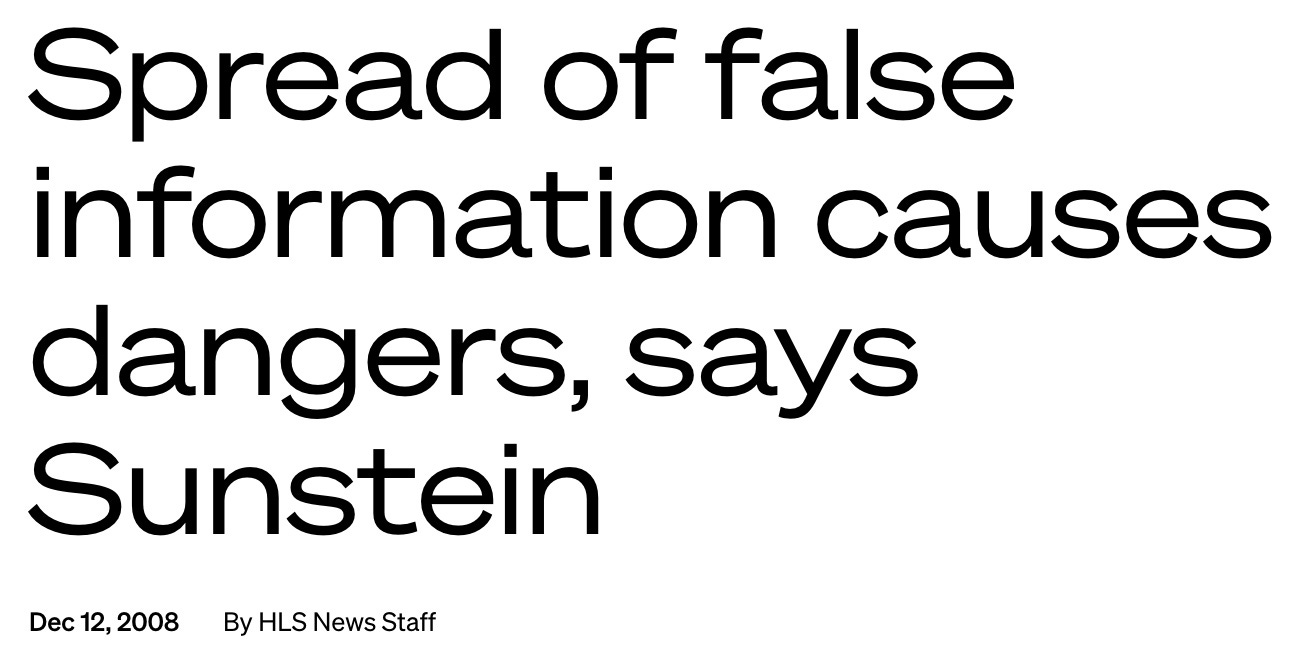Having failed to gain centralized control using the pretext of pandemics, what will the globalists try next? BEHAVIORAL HEALTH is one of their gambits
3-7 June, 2024
UN Behavioural Science Week
Two sessions with WHO behavioural scientists will take place from 3-7 June.
Speakers include:
Professor Cass Sunstein, Professor of Law, Harvard University (and member of WHO Technical Advisory Group on Behavioural Sciences for Health)
Sunstein Co-wrote the book “Nudge” and its publisher, Yale University Press, said, “The book has given rise to more than 200 “nudge units” in governments around the world and countless groups of behavioral scientists in every part of the economy.”
Above is what Sunstein told students at Harvard Law School a few years back.
Sunstein’s wife, Samantha Powers, is the head of USAID, a renowned CIA cutout that was Peter Daszak’s major funder (over $50 million dollars). She was the former US ambassador to the UN.
Back to the WHO and UN’s Behavioral Health Science:
Two sessions with WHO behavioural scientists will take place from 3-7 June.
'Collaborating with Partners to apply Behavioural Science' at 1 pm CEST on Friday, 7 June will include WHO's behavioural insights unit and the WHO Regional Office for Africa discussing the development of the global resolution on 'Behavioural Sciences for Better Health', the 'Regional Strategy for Community Engagement', and the 'European regional action framework for behavioural and cultural insights for health'. This session will also include FAO and UNICEF representatives.'Applying Behavioural Science in Health' at 3 pm CEST on Friday, 7 June will include the WHO Regional Office for Europe presenting concrete examples of methods, tools, frameworks and lessons learnt, providing a view to how behavioural science can effectively address pressing health challenges. This session will also include examples from UNAIDS and UNICEF.
Speakers include:
Amina J. Mohammed, UN Deputy-Secretary-General
Professor Cass Sunstein, Professor of Law, Harvard University (and member of WHO Technical Advisory Group on Behavioural Sciences for Health)
Claudia da Costa Martinelli Wehbe, Director of Innovation Department, Government of Brazil.
Please register using the UN Behavioural Science Week website. You can download the sessions into your calendar using this link. Recordings of the sessions will be made available on the UN Behavioural Science Week website.
The UN wants to improve its brainwashing skills, not for one week but for always, as part of the UN 2.0 plan.
https://un-two-zero.network/besci/
Behavioural Science
Enabling better choices
Just a decade ago, behavioural science was in its infancy. Today, it is a well-established discipline that many institutions are integrating into policies and programmes.
People do not always behave in predictable ways and human behaviour is often shaped by a variety of factors, including biases and mental shortcuts. If United Nations entities strengthen their behavioural science capabilities, we can increase the impact of our strategies and tailor our initiatives better to contexts.







This is an opinion piece by attorney Mike Farris that I saved probably in 2022, which I think still warrants consideration:
“WHO Cares
Conservative circles are circulating alarming information concerning the expansion of power by the World Health Organization (WHO) as proposed by the Biden administration. It is right that freedom-loving Americans should be concerned about this situation, but it is a bit different from some of the information that I have seen on social media.
Let’s start with a key governing principle.
America should make the laws for America. I have been one of the key national leaders responsible for ensuring that the United States Senate has never ratified the UN Convention on the Rights of the Child, the Convention for the Elimination of All Forms of Discrimination Against Women, and the UN Convention on the Rights of Persons with Disabilities.
I support some of the substantive rules in these treaties and oppose others. But, I will never support the use of international law to make laws of this sort.
It’s really simple. Treaty law should be about how nations treat other nations. It is a violation of the principle of self-government for any outside force to tell a nation how it must govern its own people. In general, the moral authority for internal laws belongs to the people of that nation, not the international “community.” Virtually all nations have agreed to treaties promising to honor basic human rights. I support only negative rights theories (what a government can’t do to you) rather than positive human rights (what the government must do for you: i.e. socialism). But when a nation adopts a treaty it is honor bound to live up to its terms.
Laws governing pandemics and the like belong in the class of domestic law—not international law. And under the Constitution of the United States, pandemics generally should be managed by state law not federal law.
Let’s look at the situation with WHO.
Is the Biden administration giving WHO increased power to control the domestic law of the United States vis-à-vis pandemics? Not really. At least not yet.
Here’s what’s going on.
The Biden administration has made two key proposals to the group of nations who are parties to the WHO treaty. The first allows WHO to consider what is happening relative to a pandemic in other nations in terms of issuing advisories applicable to other nations. For example, WHO can take into account what is happening regarding a pandemic in the US in an advisory applicable to Canada.
But note here that I said “advisories” not orders. WHO cannot issue any orders that bind national governments under the current treaty language.
If a nation’s leaders want to use a WHO advisory as a basis for taking action domestically, they can do so if their national law permits this. But the WHO opinion has no automatic binding legal effect.
I don’t care that much if WHO uses the information from a neighboring nation to issue one of its opinions—which is the specific issue on the table today. I am far more concerned about the very existence of WHO and even more concerned about America’s membership in this entity.
And there is no doubt that the trajectory of international law is rapidly escalating in the direction of obtaining more and more operational control over domestic policies.
A friend of mine once told me that the goal of every committee is to rule the world. And that adage should be taken quite literally relative to those institutions associated with the United Nations.
So, the current Biden proposal will not immediately result in WHO gaining control over domestic issues in the US.
And this is true despite the language of Article VI which makes properly adopted treaties a part of the Supreme Law of the Land on a par with a valid law of Congress.
The reason that the Supremacy Clause is not applicable concerning this immediate change is easy: The new proposal is not a part of a treaty. Only treaty language—not internal operating rules of an international entity--is automatically binding and only in ways stated explicitly in the treaty and permitted by our Constitution.
This brings to the related and very important other proposal by the Biden administration. They propose to create an official mechanism to begin negotiations for a new treaty instrument on pandemics which might result in an updated version of the WHO treaty.
A proposal for new treaty language is not innocent in the slightest. Every reasonable observer will readily conclude that WHO will want more power including the power to dictate domestic policies via international edicts.
The Biden Administration was embarrassed by the decision of the Supreme Court that invalidated its Covid vaccine mandate on employers. The Court held that orders regarding vaccines are within the jurisdiction of the states—not the federal government.
That ruling would have gone the other way if a treaty had been adopted giving WHO the authority to issue orders concerning global pandemics. The Biden Administration would have the jurisdiction to issue vaccine mandates and much more because the federal government, not the states, is responsible for treaty compliance.
So, here is where we need to pay attention. And we need to demand that our government follow the Constitution vis-à-vis ratification of treaties.
The original WHO treaty (and it is a treaty under international law) was not ratified by the United States Senate. And in my view, it is accordingly invalid. But, it was “adopted” by a vote of both houses of Congress. This was the same process used for NAFTA and the NAFTA update promulgated by the Trump administration.
I believe that the Constitution requires all agreements that are treaties within the meaning of international law must be ratified by the US Senate. But that is not what we practice. And, unfortunately, our practice has been sanctioned by the Supreme Court.
So even with our flawed existing practice, any change to the WHO treaty will at least have to be ratified in the same manner as the original form of approval—a vote in both houses of Congress.
So rather than being only being alerted to something at the last minute, the people who discovered the WHO process and the Biden proposal have done us a very good service by alerting us to this issue long before any action can be taken that has domestic impact on Americans.
We need to vigorously oppose any changes to the WHO treaty. Instead, we should be exploring exiting from this global governance wannabe.
Finally, let me say a word of caution about overstating the power of the current proposal.
There is a doctrine in international law called “customary international law.” This involves the creation of binding rules on countries even if they don’t explicitly agree and even if there is no treaty involved.
If we spread the word that WHO has been given authority to control the domestic policy of our country, we run the danger of rhetorically and politically backing ourselves into a corner and perhaps de facto helping to create such a rule largely out of our own exaggerated explanation of what’s really going on.
Customary international law is not an easy thing to create and it takes a long time to crystalize into binding law—but these exaggerated claims are bricks in a very dangerous wall. We need to analyze and explain the current proposal accurately.
The time to stop expansion of WHO’s power is now. The venue to stop it is in the US Congress. Let your Senators and Representatives know that you oppose any expansion of WHO’s powers—now or in the future.
If members of Congress or the White House don’t feel up to making laws that protect the United States and feel the need to give over authority on these issues to international agencies, then we need to get new people in those positions who believe Americans should make the laws for America.”
Psychology could be a noble profession. How many of them act within their professional code of ethics?
What percentage are working to enslave us? Where is the practical research on Psychopaths and how to speed their loss of power.